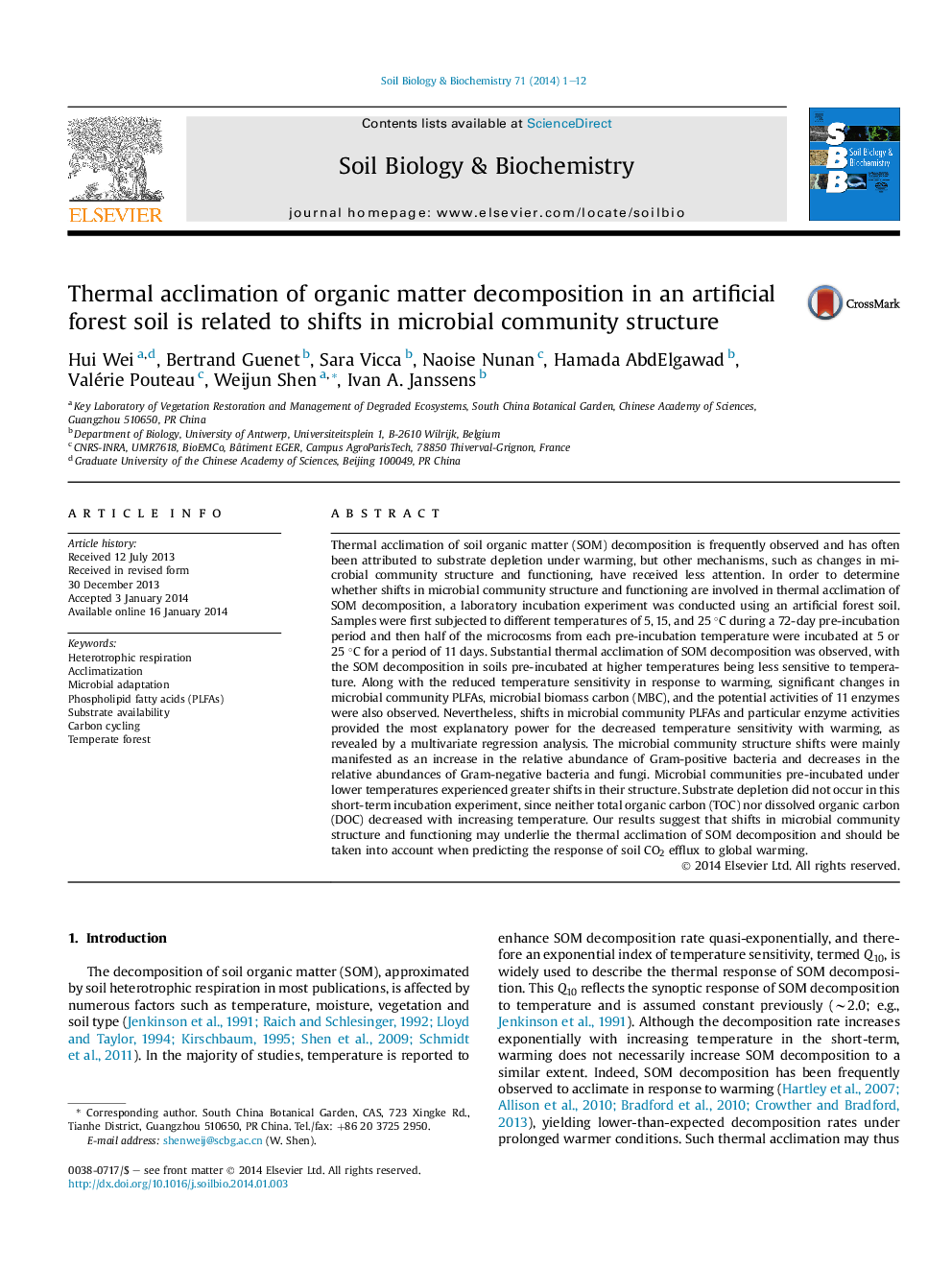| کد مقاله | کد نشریه | سال انتشار | مقاله انگلیسی | نسخه تمام متن |
|---|---|---|---|---|
| 8364821 | 1542613 | 2014 | 12 صفحه PDF | دانلود رایگان |
عنوان انگلیسی مقاله ISI
Thermal acclimation of organic matter decomposition in an artificial forest soil is related to shifts in microbial community structure
ترجمه فارسی عنوان
انطباق حرارتی تجزیه مواد ارگانیک در خاک جنگل مصنوعی به تغییرات ساختار جامعه میکروبی مربوط است
دانلود مقاله + سفارش ترجمه
دانلود مقاله ISI انگلیسی
رایگان برای ایرانیان
کلمات کلیدی
موضوعات مرتبط
علوم زیستی و بیوفناوری
علوم کشاورزی و بیولوژیک
دانش خاک شناسی
چکیده انگلیسی
Thermal acclimation of soil organic matter (SOM) decomposition is frequently observed and has often been attributed to substrate depletion under warming, but other mechanisms, such as changes in microbial community structure and functioning, have received less attention. In order to determine whether shifts in microbial community structure and functioning are involved in thermal acclimation of SOM decomposition, a laboratory incubation experiment was conducted using an artificial forest soil. Samples were first subjected to different temperatures of 5, 15, and 25 °C during a 72-day pre-incubation period and then half of the microcosms from each pre-incubation temperature were incubated at 5 or 25 °C for a period of 11 days. Substantial thermal acclimation of SOM decomposition was observed, with the SOM decomposition in soils pre-incubated at higher temperatures being less sensitive to temperature. Along with the reduced temperature sensitivity in response to warming, significant changes in microbial community PLFAs, microbial biomass carbon (MBC), and the potential activities of 11 enzymes were also observed. Nevertheless, shifts in microbial community PLFAs and particular enzyme activities provided the most explanatory power for the decreased temperature sensitivity with warming, as revealed by a multivariate regression analysis. The microbial community structure shifts were mainly manifested as an increase in the relative abundance of Gram-positive bacteria and decreases in the relative abundances of Gram-negative bacteria and fungi. Microbial communities pre-incubated under lower temperatures experienced greater shifts in their structure. Substrate depletion did not occur in this short-term incubation experiment, since neither total organic carbon (TOC) nor dissolved organic carbon (DOC) decreased with increasing temperature. Our results suggest that shifts in microbial community structure and functioning may underlie the thermal acclimation of SOM decomposition and should be taken into account when predicting the response of soil CO2 efflux to global warming.
ناشر
Database: Elsevier - ScienceDirect (ساینس دایرکت)
Journal: Soil Biology and Biochemistry - Volume 71, April 2014, Pages 1-12
Journal: Soil Biology and Biochemistry - Volume 71, April 2014, Pages 1-12
نویسندگان
Hui Wei, Bertrand Guenet, Sara Vicca, Naoise Nunan, Hamada AbdElgawad, Valérie Pouteau, Weijun Shen, Ivan A. Janssens,
